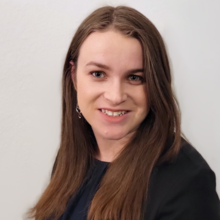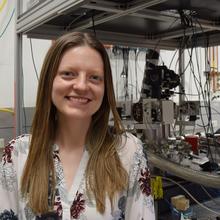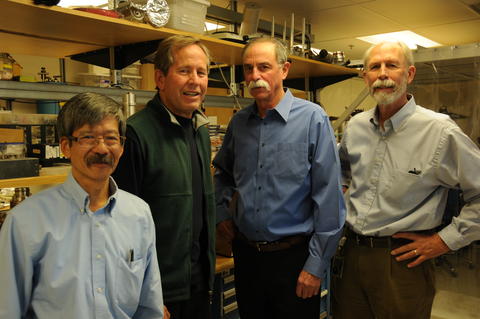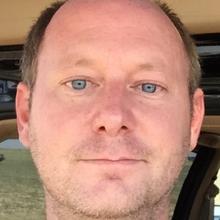Ion Storage Group Members

Staff | Postdocs | Grad Students | Alumni
Current Group Members
Staff Scientists

John Bollinger, group leader
John Bollinger was a principal on early NIST studies employing laser-cooled ions for microwave frequency standards and then carried out studies on the collective and cold plasma behavior of laser-cooled ion crystals in Penning traps, including precise characterization of the plasma modes, crystal equilibria, and structural phase transitions. His recent work has focused on the use of trapped ion crystals of several hundred ions confined in Penning ion traps for quantum information studies, including quantum simulation and quantum metrology.

Allison Carter
Allison Carter’s work focuses on using large crystals of ions in a Penning trap to perform quantum simulations and sensing. She is interested in the use of trapped ions as a quantum information platform and in developing techniques for improving quantum information processing with trapped ions.

James Chin-Wen Chou
- Staff profile page
- Precision Spectroscopy and Quantum Control of Trapped Molecular Ions
- Trapped Ion Optical Clocks
James Chou has worked in the fields of quantum information and precision measurements including atomic ensemble-based quantum communication, neutral atom quantum registers, and Al+ ion optical clocks. He is currently working on advancing both fronts for molecular ions, using the tools developed in quantum information for precision measurements and vice versa.

David Hume
David Hume's work aims at developing and improving optical clocks using quantum metrology techniques. Notably, quantum-logic spectroscopy allows for precision measurement of a broad array trapped-ion species that cannot be directly laser cooled or detected.

Dietrich Leibfried
- Staff profile page
- Quantum Computing with Trapped Ions
- Quantum Networking with Trapped Ions
- Precision Spectroscopy and Quantum Control of Trapped Molecular Ions
Dietrich Leibfried's main interests are quantum information processing, quantum simulation, quantum networking, and quantum control with trapped atomic and molecular ions.

Mason Marshall
Mason Marshall works on precision measurements using quantum control of trapped ions. His research centers on improving atomic ion optical clocks both for fundamental time metrology and for new tests of physics beyond the standard model, with current focus on developing an improved Al+ ion clock.

Ravid Shaniv
Ravid Shaniv is interested in developing methods for computing, simulation and sensing with trapped ions, with emphasis on harnessing the unique coupling between ions quantized motion and their electronic state. He is specifically interested in theorizing and demonstrating techniques that capitalize on the use of multiple motional modes in an ion crystal, as well as using different traps design to engineer interesting and useful motion of ions.

Daniel Slichter
Daniel Slichter's research focuses on quantum information experiments with trapped atomic ions, with an emphasis on developing new paradigms for scalable trapped ion quantum computing, integrating control and readout elements into microfabricated ion traps, and performing high-fidelity long-range quantum networking between trapped ion nodes using telecom-wavelength photons.

Lindsay Sonderhouse
Lindsay Sonderhouse researches remotely entangled quantum systems, specifically using optical cavities interfaced with trapped ions. Her interests include building a quantum repeater that is capable of entangling systems separated by 10s of km for use in quantum communication, quantum computation, and enhanced sensing using optical atomic clocks. She is also interested in studies of cavity QED.

Andrew Wilson
Andrew Wilson is the Chief of the NIST Quantum Physics Division and supports the broad quantum information science program at NIST. He is based at JILA, the joint institute of NIST and the University of Colorado Boulder. In the Ion Storage Group, he performed quantum-information experiments on high-fidelity coherent control of atomic ions to explore applications of quantum entanglement including quantum logic and computing, quantum simulation, and quantum-enhanced precision measurement. A major emphasis of this research is the development of techniques and tools that will be needed for large-scale, fault-tolerant, quantum-information processors.
Emeritus Staff

James C. Bergquist, Scientist Emeritus berky [at] boulder.nist.gov (Email)
Wayne Itano, Scientist Emeritus wayne.itano [at] nist.gov (Email)
David J. Wineland, NIST Associate djw34 [at] uoregon.edu (Email)
Postdoctoral Researchers

Jennifer Lilieholm
Jennifer is a postdoc on the Penning trap experiment. She got her PhD in physics from the University of Washington working with an RF ion trap looking at quantum jumps and mixed species entanglement. She went to the University of Maine for undergrad and received Bachelor’s degrees in math and physics while performing biophysics research on the motion of molecules in live cells.

Baruch Margulis
Baruch is a Rothschild postdoctoral fellow working on the cryogenic molecular ions experiment. He got his Ph.D. in 2023 from the Weizmann Institute of Science under the supervision of Prof. Ed Narevicius, investigating scattering resonances in cold molecular collisions. When not in the lab he enjoys hiking with his family and cooking.

AJ Rasmusson
AJ Rasmusson is an NRC postdoctoral researcher working on the next generation of trapped-ion quantum hardware systems. In 2024, he received his Ph.D. in Physics from Indiana University where, under the supervision of Phil Richerme, he studied 2D trapped-ion crystals, trapped-ion thermometry and heating, and simulation of quantum chemical effects using trapped ions. AJ was the principal lead for IBM's Open Science challenge from 2021 - 2023, and he currently serves on the Unitary Fund's Open Quantum Benchmark Committee. Outside of the lab, he enjoys playing outside with his family, reading, and 3D printing.
Graduate Students

John Barta
John started his graduate studies at the University of Colorado Boulder in 2023 and is now working in trapped ion quantum computing. He received his Computer Engineering degree from the University of Florida in 2018. In between the aforementioned schooling, John's work focused on firmware development, especially that involving FPGAs. John enjoys running, tennis, baking, and board games. If you have any good logic puzzles, send them his way!

Christina Bowers
Tina is a graduate student on the Quantum I (MagTrap) project. She received her Bachelors degree in Physics from Colgate University in 2018. She worked in industry while taking graduate courses at Stanford University until 2022, when she enrolled at CU Boulder and joined the Ion Storage Group.

Margaret Bruff
Margie is a graduate student and NSF GRFP fellow working on the quantum network project. She received her Bachelor’s degrees in physics and math from the University of North Carolina at Chapel Hill She did undergraduate research in computational cosmology before becoming interested in quantum information in her junior year and getting started with trapped ions in her senior year with Prof. Jungsang Kim’s group at Duke University.

Bryce Bullock
Bryce is a graduate student on the Penning trap experiment under John Bollinger. He received his bachelor’s degree in physics, math, and computer science from Tulane University in 2018, and his master’s in physics from CU Boulder in 2020.

Dalton Chaffee
Dalton is a physics PhD student at CU Boulder who has been working on the cryogenic molecular ion experiment since 2019. He holds bachelor’s degrees in electrical engineering and applied physics from Purdue University. When not trapping ions, Dalton enjoys exploring nature and throwing plastic discs.

Kaitlyn David
Katie is a graduate student on the quantum network project. She completed her B.S. in Engineering Physics at Tulane University in 2018 where she did research in nonlinear and quantum optics with Prof. Ryan Glasser. She worked for two years as a Physical Scientist in the Acoustics Department of the Naval Oceanographic Office before starting grad school and joining the Ion Storage Group.

Willa Dworschack
Willa is a graduate student on the Al+ ion clock team. She became interested in AMO as an undergraduate at Lawrence University. She graduated in 2020, earned her master's from CU in 2023 while experimenting on neutral atoms in optical tweezers, and was an NSF GRFP fellow. When she's not probing trapped ions with lasers, Willa enjoys knitting and training for triathlons.

Philip Kent
Philip graduated from the University of Colorado in 2018 with a bachelors degree in engineering physics. He also holds a bachelors degree in applied mathematics from the University of Colorado. He joined the Stylus experiment as an undergraduate in 2016, working on transitioning the experiment to the ARTIQ control system. He continued on the Stylus experiment as a Ph.D. student at C.U. in 2019 and is currently working on studies to better understand electric field noise from surfaces with the aim of reducing its effect on trapped ions.

Zhimin (Cheryl) Liu
Cheryl is a graduate student on Trapped Molecular Ions project. She received her Bachelor’s degree in physics from Bryn Mawr College.

Diep Nguyen
Diep is a graduate student working on the Penning trap experiment. She received her bachelor's degree in physics in 2022 and her master's degree in physics in 2024 from Nagoya University in Japan, where she did experimental research in condensed-matter quantum systems with NMR spectroscopy and nitrogen-vacancy (NV) color centers in diamond.

Sam Olson
Sam is a graduate student at CU Boulder working with trapped magnesium and beryllium ions for quantum computing applications. Before working in the ion storage group, Sam graduated with a bachelor’s degree in physics from Colorado State University in 2023 while working with laser lithography and later, trapped ions.

Daniel Rodriguez Castillo
Daniel is a graduate student on the Al+ clock project. He received his bachelor's degree in electrical engineering and physics from George Mason University.

April Sheffield
April is a graduate student working on the cryogenic trapped molecular ions experiment. She completed her bachelor's degree in physics at Rice University in 2024, where she worked for 3 years in Prof. Guido Pagano's group on building a trapped ion system based around a monolithic 3D blade trap for long-chain analog quantum simulation with 171Yb+ ions.

Ingrid Zimmermann
Ingrid is a graduate student working on quantum computing with trapped beryllium and magnesium ions. She completed a bachelor’s degree in physics from Rutgers University, during which time she was introduced to experimental physics at the National High Magnetic Field Laboratory by Ross McDonald and Laurel Winter, and at Weida Wu’s condensed matter lab in Rutgers.
Group Alumni
| Name | Role | Years in Group | Current Position |
|---|---|---|---|
| Justin Niedermeyer | Ph.D. student | 2019 - 2025 | Oxford Ionics |
| Jenny Wu | Ph.D. student | 2018 - 2024 | Quantinuum |
| Hannah Knaack | Ph.D. student | 2018 - 2024 | Oxford Ionics |
| Nathan Lysne | Postdoc | 2021 - 2024 | Quantinuum (RIKEN) |
| Adam Brandt | Postdoc | 2021 - 2024 | Vapor Cell Technologies |
| Laurent Stephenson | Postdoc | 2020 - 2024 | Quantum Fabrix |
| Jules Stuart | Postdoc | 2021 - 2024 | IonQ |
| Jose Valencia | Ph.D. student | 2018 - 2023 | Vescent |
| Yu Liu | Postdoc | 2020 - 2023 | Assistant Professor, Univ. of Maryland |
| April Reisenfeld | Postbac student | 2021 - 2023 | Master's student, Western Univ. |
| Alejandra Collopy | Postdoc | 2018 - 2023 | Staff scientist, NIST |
| Matt Affolter | Postdoc | 2018 - 2023 | Avalanche Energy |
| Julian Schmidt | Postdoc | 2020 - 2023 | Staff scientist, Paul Scherrer Institute |
| Matthew Bohman | Postdoc | 2020 - 2023 | MPIK Heidelberg |
| Panyu Hou | Postdoc | 2018 - 2023 | Assistant Professor, Tsinghua Univ. |
| Giorgio Zarantonello | Postdoc | 2020 - 2022 | Lead Quantum Scientist, QUDORA |
| David Leibrandt | Postdoc, staff member | 2009 - 2022 | Professor, UCLA |
| Ethan Clements | Ph.D. student | 2017 - 2022 | Postdoc, MIT (Chuang group) |
| Daniel Cole | Postdoc | 2018 - 2021 | Infleqtion |
| May Kim | Postdoc | 2018 - 2021 | Staff scientist, MIT Lincoln Laboratory |
| Kyle McKay | Postdoc | 2012 - 2021 | Quantinuum |
| Stephen Erickson | Ph.D. student | 2016 - 2021 | Quantinuum |
| Kevin Gilmore | Ph.D. student | 2015 - 2021 | Quantinuum |
| Shaun Burd | Ph.D. student | 2015 - 2020 | Postdoc, Stanford (Kasevich group) |
| Raghavendra Srinivas | Ph.D. student | 2014 - 2020 | Research Fellow, Univ. of Oxford |
| Susanna Todaro | Ph.D. student | 2015 - 2020 | Oxford Ionics |
| Elena Jordan | Postdoc | 2016 - 2020 | Postdoc, PTB Braunschweig |
| Katie McCormick | Ph.D. student | 2012 - 2019 | IBM Quantum |
| Yong Wan | Postdoc | 2014 - 2019 | Professor, Univ. of Science and Technology of China |
| Sam Brewer | Postdoc | 2012 - 2019 | Assistant Professor, Colorado State Univ. |
| Daniel Kienzler | Postdoc | 2016 - 2018 | Senior scientist, ETH Zurich |
| Aaron Hankin | Postdoc | 2014 - 2018 | Quantinuum |
| David Allcock | Postdoc | 2013 - 2018 | Assistant Professor, Univ. of Oregon |
| Justin Bohnet | Postdoc | 2014 - 2017 | Quantinuum |
| Jwo-Sy Chen | Ph.D. student | 2011 - 2017 | IonQ |
| Yiheng Lin | Ph.D. student, postdoc | 2010 - 2017 | Professor, Univ. of Science and Technology of China |
| Ting Rei Tan | Ph.D. student | 2010 - 2016 | Research Fellow, Univ. of Sydney |
| Yves Colombe | Postdoc | 2008 - 2013 | Infineon Technologies |

